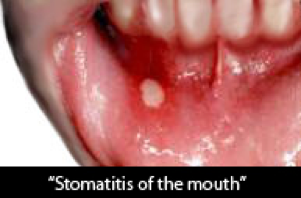A dry mouth means that there is less saliva (spit) in the mouth, which can cause the soft tissues in the mouth to get irritated. The irritation often leads to infection. With less saliva, a person is more likely to have a sore throat, problems speaking, trouble swallowing and dry nose. Cavities of the teeth are also more common in persons with dry mouth.
An inflammation (redness and swelling) of the mucous tissues in the mouth. A person will have burning in the mouth, pain and a change in the amount and type of foods they can eat.
Mouth ulcers are also common, ranging from mild to very severe. Stomatitis is often caused by infection, an allergic reaction and physical irritation of the mouth. Certain diseases can cause stomatitis.

Stomatitis of the mouth